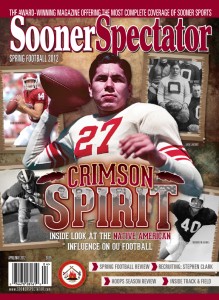 More than a half-century before Prentice Gautt became the first African-American to play football at the University of Oklahoma, a strapping young man named Key Wolf broke the school’s original color barrier. When the Chickasaw player took the field for the Oklahoma Rough Riders on Oct. 9, 1905, he started a tradition of Native American influence at OU that has continued to thrive for more than 100 years.
More than a half-century before Prentice Gautt became the first African-American to play football at the University of Oklahoma, a strapping young man named Key Wolf broke the school’s original color barrier. When the Chickasaw player took the field for the Oklahoma Rough Riders on Oct. 9, 1905, he started a tradition of Native American influence at OU that has continued to thrive for more than 100 years.
Wolf’s arrival to Norman coincided with that of first-year coach Bennie Owen, a Chicago native and Kansas graduate who would become the face and voice of OU athletics over the next two decades. During that span, Owen regularly assembled teams that featured Native American players who he believed had an inherent desire to honorably represent their school and their people.
Ironically, Wolf almost didn’t get the chance to demonstrate his talents under Owen’s expert tutelage, thanks to an incident that unfolded on the first day of practice in 1905. Hoping to make a good first impression on his new coach, Wolf exaggerated his football experience and was embarrassed when Owen called his bluff.
“I had heard big fellows always played center,” Wolf told author Harold Keith for his book “Oklahoma Kickoff.” “So I told Bennie I had played center. Well, the first thing he did was put me over the ball.”
In reality, the 5-foot-7, 210-pound Wolf had never played a single down of football. Although athletically gifted, the Davis product had no idea what to do from his newfound position. Once Owen realized this, he sauntered over and kicked a startled Wolf in the seat of his pants.
It was an inauspicious beginning to what would blossom into a memorable relationship for the pair.
Nicknamed “Big Chief,” Wolf proved to be a fast learner while playing on both sides of the ball. His stout frame and quick feet made him a force to be reckoned with during his four seasons with Owen’s squad. He helped OU beat Texas for the first time ever in 1905 and would eventually earn the rank of team captain for the 1908 season.
Wolf’s performances on defense and as an occasional ball carrier on offense earned him high praise from a variety of news outlets, one of which described him as “the best defensive player in the Southwest” in 1908. That season, the Sooners went 8-1-1, defeated Texas 50-0 and won the Southwest championship.
Even more important than Wolf’s on-the-field efforts was the fact that he had helped open OU’s doors for future generations of Native Americans, including numerous Sooner standouts like Jack Jacobs, Bob Sumter, Tommy Tallchief, Wahoo McDaniel, Sam Claphan and 2008 Heisman Trophy winner Sam Bradford. And while not all of OU’s Native American players have been stars, each has played a role in building a remarkable football tradition that is second to none.
“From Key Wolf over 100 years ago to Sam Bradford, Native Americans have long played key roles in the OU football program,” said University of Oklahoma President David Boren. “Personal courage and steadiness under pressure, which are important attributes of native culture, have helped the Sooners establish the greatest tradition in college football. OU is extremely proud of our Native American heritage.
“In part, great Oklahoma Native American football players like Jim Thorpe, who played for the Carlisle Indian School in Pennsylvania, helped to create modern American football. Native American players at Carlisle defeated football powers at the turn of the last century like Army and Princeton. The story of the first Native American players is told in the book “The Real All Americans.’”
Wolf and others have done their part to not only extend that success story well into the 21st Century but make it an indelible part of college football history.
“It’s something you definitely take a lot of pride in when looking back at the Native Americans who have been a part of that story,” said Bubba Burcham, a Choctaw and four-year OU letterman (1997-2000).
With Wolf earning his geology degree and set to charge off into the world to become a highly successful coach in his own right, the baton was passed to James Nairn, a full-blood Delaware from Nowata who picked right up where his mentor left off on both sides of the ball.
(Editor’s note: This is part of the feature story in Sooner Spectator’s new Native American Tribute issue, on newsstands May 5. To subscribe, call toll free 1-877-841-8877)
(Re-posted with special permission from Sooner Spectator magazine, to get more info visit the website @ http://www.soonerspectator.com/index.php)